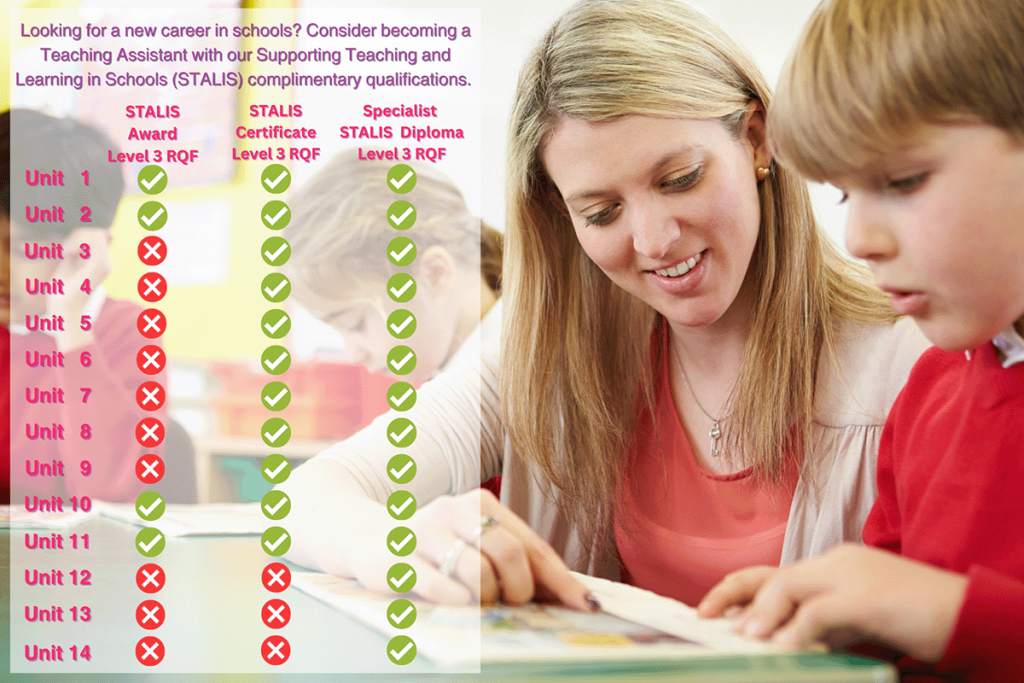At this time of the year we are always looking at whether we are satisfied with our lives and what we can do during the upcoming year to improve things for ourselves and our families. It is a great opportunity to evaluate job satisfaction, and possibly think about taking that step to begin to work towards changing your career, particularly if you feel held back by personal circumstances or a lack of qualifications.

Our learners often get in touch to celebrate their success with us and to show their appreciation for us supporting them through the process, and it is because of this we are able to share with you some of their success stories.
Judith’s journey into teaching
In 2013 Judith became a learner with NCC Home Learning and embarked upon a Level 3 Supporting Teaching and Learning Certificate which she was able to complete within 8 months.

“Years ago when I started working as a teaching assistant I was just taken on at my local school on a part-time basis because my children went there. I love working with children, and I think I am good at what I do, I have made a difference in terms of innovation in our school. After working here for 7 years I was invited to go for my Supporting Teaching and Learning Certificate as part of my PDP.
Initially, I wasn’t sure that I could go back to learning, particularly as I had a busy home life with 4 kids to raise as a single mum, but I gave it a go. I managed to pass the course quite easily and after a year I asked the Headteacher if I could take on the Higher Level Teaching Assistant certificate again for PDP, funding was found to support this and I was a HLTA for 6 years. I did both my courses through NCC because our bursar had previous experience dealing with them, and she knew that they were a reputable company. I have to say that with both courses I was taken care of really well and my tutor support was excellent. When I was doing my HLTA, I did have a second tutor because of maternity leave, but the transition did not affect me. After being a HLTA for 5 years, my Headteacher suggested me doing a PGCE. I already had a BA (Hons) Applied Art, and my Headteacher informed me that I could do the PGCE course as an apprenticeship and obtain my QTS upon completion.
After a very tough year and a half in terms of both the demands of the PGCE, but also personal demands because my mum passed away, I did actually achieve a job as a qualified teacher obviously at the same school that have supported me through the process. My mum would be so proud of my achievement.
Thank you to NCC, because without the courses that I did which evidenced my knowledge and ability, I never would have progressed to where I am now. I never imagined when I left school that I would become a teacher, but I love the work I do and the difference I make in my children’s lives. Without online learning to enable me to study around my work, I could never have afforded financially to get to where I am now.”
Teaching assistant courses offered by NCC
NCC offers a range of qualifications designed to support the professional growth of teaching assistants. As pioneers of the Higher Level Teaching Assistant (HLTA) qualification, we have been at the forefront of empowering teaching assistants to advance in their careers.
For individuals entering the field, our Supporting Teaching and Learning in Schools (STALIS) suite includes a foundational knowledge-based qualification, which is the Supporting Teaching and Learning in Schools Award Level 3 RQF. This allows those who may not have immediate access to a school placement to obtain a formal qualification, enhancing their prospects of securing a teaching assistant role. Upon completion, learners can seamlessly progress to the Level 3 STALIS Certificate at a reduced cost, building on the modules they have already completed. Further advancement is facilitated through the Specialist Support for Teaching and Learning in Schools Level 3 Diploma RQF, with the opportunity to leverage completed certificate units to streamline the progression process.
Ready to start? Enroll in one of our Teaching Assistant online courses now.

Experienced teaching assistants seeking to enhance their qualifications and earning potential can aspire to become Higher Level Teaching Assistants. NCC provides a tiered suite of qualifications to support this journey. For instance, a teaching assistant aspiring to become an TQUK Higher Level Teaching Assistant (HLTA) Level 4 Award independently, tailoring their pace to accommodate work commitments. This award serves as evidence of the knowledge required for an HLTA role, potentially opening doors for career progression within the same school or elsewhere. It’s important to note that achieving HLTA status is typically determined by the school, and additional requirements may be required beyond the Award to secure this status.
This year, NCC has expanded its Higher Level Teaching Assistant suite by introducing an Ofqual-regulated TQUK Higher Level Teaching Assistant (HLTA) Level 4 Diploma. This diploma offers a higher level of qualification beyond the Higher Level Teaching Assistant Certificate – HLTA Level 4 RQF, allowing individuals to further extend their professional development. Similar to our approach in Supporting Teaching and Learning in Schools, learners can leverage previously completed units from the Certificate qualification, saving both time and costs on their journey toward achieving the Diploma.

NCC is happy to provide further information or respond to any questions regarding these courses, or any of our courses on our website. Simply email [email protected] to communicate with one of our dedicated sales team, who will be happy to clarify anything that is unclear after reading the course details on our website.
FAQs
Numerous online courses offer pathways to becoming a teacher; nevertheless, it’s important to note that these courses typically demand a certain level of education and might not confer Qualified Teacher Status (QTS), a prerequisite for teaching in state schools in the UK.
Achieving the status of a qualified teacher without a traditional degree is possible, albeit an uncommon route. Some independent schools, private institutions, or academies may recruit teachers without degrees, but these positions can be competitive and may limit career progression. For service members leaving the military without an undergraduate degree, the Troops to Teachers program provides an alternative option.
To become a primary school teacher in the UK without a degree, you would need to consider alternative routes to teacher training, such as School Direct or Teach First. These pathways require you to have some education and relevant experience working with children.
When used effectively, a teaching assistant can bring about an improvement in a pupil’s reading of between three and six months. Great news for those students taking a teaching assistant course to improve their skills in the classroom.
The evidence comes from two reading support programmes run by teaching assistants. Research has also shown that how teaching assistants have traditionally been used – working with low-attaining pupils, usually on an ad hoc or as-and-when-basis – does not result in improvement in children’s learning, as it assumed it would.
Make more of an impact
The way in which many teaching assistants are used in the classroom is having little positive effect. Worryingly, research from the Education Endowment Foundation (EEF) show that it can have a negative impact on student outcomes; not what a hardworking teaching assistant wants to hear.
But when do teaching assistants have more of an impact? There are seven steps to a clearer opportunity to get more for students and for teaching assistants in the classroom.
Not an informal teaching resource
Firstly, the EEF suggests that many teaching assistants used to work with low-attaining pupils are actually doing very little for advancing or improving outcomes.
This is because many of these small groups of one-to-one sessions are informal, not structured and not well supported. In a small number of schools where smaller group work was planned and effectively resourced, children did make progress.
All too often, TAs are directed on the day or at the start of a lesson to work with a small group of children or young people; they are often not briefed and have no real idea what the outcome of the lesson is.
Use teaching assistants to add value to the learning process
The teaching assistant is often seen as a support mechanism that can be moved as and when required or used as a substitute when there is no teacher available.
When teaching assistants and their contribution to the classroom are not always valued as highly as they should be, it can be ‘easy’ to simply place people where there is a perceived need, including covering for absent colleagues or working with a ‘difficult’ class or group.
Support independent learning
For those studying a teaching assistant course, they will be aware of the need for children and young people to understand their own learning, how and why they get to the outcomes that they do.
Teaching assistants are instrumental in this process – or they can be. This links with the first point of a teaching assistant being used in a structured and supported way. It also points to the need for TAs to be trained to offer the learning process to students whereby they manage their own learning.
Trained and prepared teaching assistants
It is common practice for teaching assistants to be assigned to classes or teaching colleagues at the start of the year. They may be given scant information about certain students, and no information about others.
However, these research projects found that trained TAs in the classroom made more of an impact; but teaching assistants who were fully prepared before each lesson, given time outside of lessons to meet with teaching colleagues and so on, made a far bigger impact on learning outcomes for students.
Structured interventions
Following on from this last point, and the crux of the research projects findings, is the need to use teaching assistants in planned, structured sessions. This means high quality one-to-one sessions and small group support too.
Use effective and proven session formats
There is evidence that shows a long-term relationship between student or students and a teaching assistant can lead to a negative impact on learning, although the relationships they create can be positive.
The following sessions are thought to be the most effective, backed by the findings of the research projects:
- Brief sessions of between 20 and 50 minutes
- Regular sessions of three to five times a week
- Sustained sessions over a period of eight to 20 weeks
Every day connection between teacher and teaching assistant
For those on Teaching Assistant courses online, they are encouraged to connect with their teaching colleague on a regular basis, and the findings of the research project confirm that when there is a structured, daily ‘meeting’ between the teacher and the teaching assistant, the learning outcomes for all students in the classroom are improved.
In summary
Being a teaching assistant is a rewarding role in the classroom, and it is a profession that primary and secondary schools are beginning to value even more. Teaching assistants can also work in pupil referral units and in some colleges too.
To find out more about the reading support groups and the research findings, take a look at The Education Endowment Foundation and the Reach programme.
